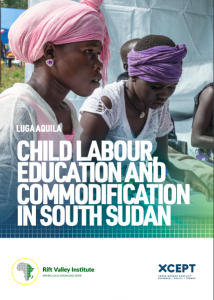Until the latter part of the twentieth century, South Sudanese boys and girls grew food on household farms for their families to eat. Under this system, children’s work and education were hard to distinguish. Today, however, many boys and girls work for money outside of their household farm and use the money to support their education in schools. Child Labour, Education and Commodification in South Sudan examines why this change took place and the effect it has had on children’s education and the wider processes of commodification and marketization that have taken place in the country.
This report is a product of the FCDO’s Cross-Border Conflict Evidence, Policy and Trends (XCEPT) programme, funded by UK aid from the UK government.




